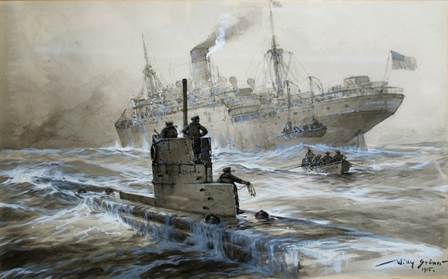30 January 1916
Lieutenant Commander Otto Hersing, commanding SM U-21 was on patrol in the Irish Sea, when on 30 January 1915, he surfaced alongside the SS Linda Blanche, a 539 tons British merchant coastal vessel, built in 1914. Sticking to the prize rules, the steamer’s crew were instructed to leave the ship, after which Hersing ordered charges to be placed on the vessel. The explosives were then set off and the ship sank. To avoid any British patrols that would come on the scene after the sinking, U-21 withdrew from the area and cruised back to its base at Ems. Just under four months later, Hersing and his U-21 would then go on to become the scourge of the Dardanelles!

(With plenty of artistic licence, the depiction of the Linda Blanche and U-21 by German marine artist Willi Stöwer 1915. (Public domain)
There was an interview with a crew member of the Linda Blanche, which appeared in the press:
“The crew of the steamer Linda Blanche, who landed at Fleetwood after the sinking of their vessel, declared that they had been well treated by the Germans, who had given them cigars and cigarettes. One of the officers told them he was sorry to have to inconvenience them, but he had orders to sink all British craft. Interviewed by a Press Association representative, John Thomas Ellis, of Bangor, one of the crew of the Linda Blanche, stated that they were on a voyage from Manchester to Belfast with general cargo. They left Manchester at four o'clock on Friday afternoon, and anchored for some time in the Mersey. At eight o'clock on Saturday evening the voyage was resumed , and at 12.30, when the vessel was due west of Liverpool Lightship, the German submarine U-21 came alongside suddenly. The German officer, who spoke perfect English, instructed the skipper, Captain Ellis (uncle of the man interviewed), to take the crew off within ten minutes. The two small boats of the vessel were quickly lowered and the crew got into them. The German sailors then fixed a mine on the bridge of the vessel and one in the forecastle, and these exploded. The vessel was a complete wreck in five minutes. The Germans told the crew there was a trawler in a certain direction, and at two o'clock in the afternoon they were picked up by it. The interviewed man told an interesting incident in connection with the skipper's fox terrier. In their haste to get into the boat the animal was overlooked, and when the crew had cleared off, the dog jumped into the sea and swam to the small boats. When Ellis was interviewed the dog was in his arms.”
"SOURCE:
[Aberdeen Daily Journal 1.2.1915] accessed through: https://www.wrecksite.eu/wreck.aspx?13341
